GALLUP NEWS SERVICE
PRINCETON, NJ -- Dan Rather signs off tonight as anchorman of the "CBS Evening News," 24 years to the day that he first took over as anchorman of the program. In recent months, Rather has been under fire for his Sept. 8, 2004, report on "60 Minutes Wednesday," which broadcast a story about President George W. Bush's National Guard service that relied on documents that could not be authenticated.
A recent CNN/USA Today/Gallup poll finds that Americans rate Rather's believability lower than that of fellow anchormen Peter Jennings of ABC or Brian Williams of NBC. Only a slight majority of Americans say they believe what Rather says -- the lowest score Rather has received on this measure since the question was first asked in 1985. Roughly a third of Americans also say Rather's broadcasts are too liberal, slightly lower than the percentage who characterize "most news anchors' broadcasts" as too liberal.
Rather's Believability Reaches 20-Year Low
The CNN/USA Today/Gallup poll, conducted Feb. 25-27, asked Americans to rate the believability of the three nightly network news anchormen on a scale from 1 ("you believe almost nothing of what they say") to 4 ("you can believe all or most of what the person says").
The results show that Jennings of ABC's "World News Tonight" scores the highest of the three nightly news anchormen, with 68% of Americans giving him a "3" or "4" on the 4-point scale. Williams of "NBC Nightly News" is second, at 57%. Rather, at 52%, rates slightly lower than Williams.
Please rate how much you think you can believe each person I name on a scale of 4 to 1, where "4" means you can believe all or most of what the person says and "1" means you believe almost nothing of what they say. How would you rate the believability of -- [Peter Jennings of ABC World News Tonight; Dan Rather of the CBS Evening News; Brian Williams of NBC Nightly News ] -- on this scale of 4 to 1?
|
Feb 25-27, 2005 |
Believe |
3 |
2 |
Believe |
NEVER |
No |
"3" + "4" |
|
% |
% |
% |
% |
% |
% |
% |
|
|
Peter Jennings of |
31 |
37 |
19 |
8 |
1 |
4 |
68 |
|
Brian Williams of |
21 |
36 |
20 |
5 |
9 |
9 |
57 |
|
Dan Rather of the |
23 |
29 |
25 |
19 |
1 |
3 |
52 |
|
(vol.) Volunteered response |
|||||||
Rather's credibility has dropped substantially -- due most likely to the controversy surrounding last year's National Guard story -- since this question was last asked by The Pew Research Center in 2002. At that time, all three nightly news anchormen were rated essentially the same. Seventy-two percent of Americans rated Tom Brokaw, then-current anchorman of "NBC Nightly News," with a "3" or a "4" on the 4-point scale, followed by Rather, at 71%, and Jennings, at 70%. Williams, who was officially announced to be Brokaw's successor about two weeks after this poll was conducted, received only a 34% rating in that survey, with nearly half of Americans having no opinion on his believability.
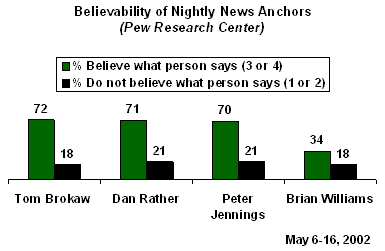
Over the seven times that The Pew Research Center asked this question from 1985 through 2002, Rather's believability score (based on "3" and "4" responses on the 4-point scale) averaged 74%, with a high of 81% in 1985 and a low of 68% in 1996. This is just slightly higher than the 71% average for both Brokaw and Jennings across that same period.
Rather Not Seen as More Liberal Than "Most News Anchors"
The poll finds that 35% of Americans say Rather's news broadcasts are too liberal, while 13% say they are too conservative. The plurality of Americans (37%) say his broadcasts are about right.
Comparatively fewer Americans perceive Rather's newscasts to be liberal than perceive other anchors' newscasts, more generally, to be liberal. Roughly 4 in 10 Americans (42%) say "most news anchors' broadcasts" are too liberal. One in four adults nationwide say most news anchors' broadcasts are too conservative, and 28% say these anchors' broadcasts are about right.
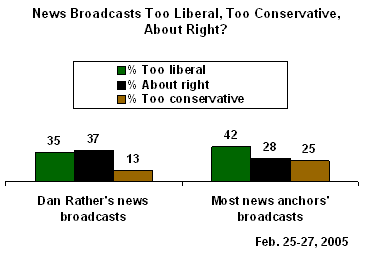
After National Guard Story, Americans Mostly Positive About Rather, CBS News
In late September 2004, about two weeks after CBS' original broadcast of the National Guard story, Gallup asked Americans several questions about Rather and CBS News.
- Fifty-five percent of Americans said they were very (17%) or
somewhat (38%) confident that CBS News reports its stories
accurately. By comparison, a slight majority of adults nationwide,
52%, said they were at least somewhat confident that news
organizations other than CBS News report their stories
accurately.
- A majority of Americans, 56%, said CBS News reported the
National Guard story mostly "as an honest mistake due to
carelessness in their fact checking and reporting," while 38% felt
the story was broadcast mostly "due to a desire to make George W.
Bush look bad."
- When asked if CBS News should fire Rather for reporting the story, Americans said no -- by a margin of 64% to 26%.
Partisanship Shapes Opinions of Anchors' Broadcasts
The current poll finds substantial differences between Republicans -- including independents who lean toward the Republican Party -- and Democrats, including Democratic leaners.
There is a 27-point gap between Republicans' and Democrats' ratings of Rather's believability, with Democrats more likely to give Rather a "3" or a "4" rating on the 1-to-4 believability scale. There is a similar difference, albeit not nearly as pronounced, in the partisan ratings of Jennings. Republicans and Democrats show no difference in their ratings of Williams.
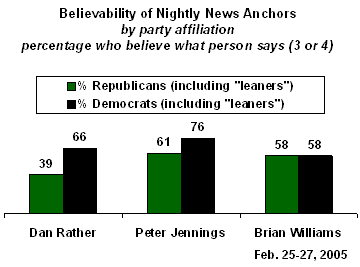
Republicans also are much more likely than Democrats to view news anchors' broadcasts as too liberal. Fifty-six percent of Republicans say Rather's broadcasts are too liberal, while a slightly higher percentage of Republicans (62%) say most anchors' broadcasts are too liberal. About a third of Republicans say Rather's broadcasts and other anchors' broadcasts are too conservative or about right.
Democrats are evenly divided as to whether Rather's broadcasts are too liberal (17%) or too conservative (18%). Half say they are about right. When asked about most anchors' broadcasts, 22% of Democrats say they are too liberal, 36% say too conservative, and 36% say about right.
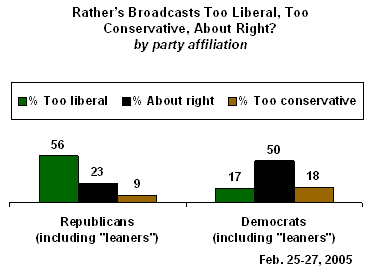
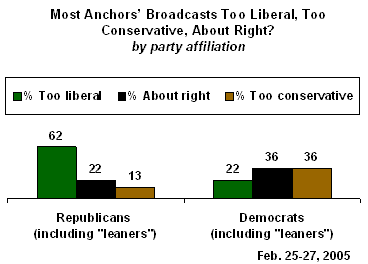
The finding that Republicans are more inclined to view the news media as too liberal is not new. In Gallup's Sept. 13-15, 2004, poll, 77% of Republicans said the news media are too liberal, compared with only 20% of Democrats.
Survey Methods
These results are based on telephone interviews with a randomly selected national sample of 1,008 adults, aged 18 and older, conducted Feb. 25-27, 2005. For results based on this sample, one can say with 95% confidence that the maximum error attributable to sampling and other random effects is ±3 percentage points. For results based on the 526 national adults in the Form A half-sample and 482 national adults in the Form B half-sample, the maximum margins of sampling error are ±5 percentage points. In addition to sampling error, question wording and practical difficulties in conducting surveys can introduce error or bias into the findings of public opinion polls.
21. Please rate how much you think you can believe each person I name on a scale of 4 to 1, where "4" means you can believe all or most of what the person says and "1" means you believe almost nothing of what they say. How would you rate the believability of -- [RANDOM ORDER] -- on this scale of 4 to 1?
|
2005 Feb 25-27 |
Believe |
3 |
2 |
Believe |
|
No |
|
% |
% |
% |
% |
% |
% |
|
|
Peter Jennings of ABC "World News Tonight" |
31 |
37 |
19 |
8 |
1 |
4 |
|
Dan Rather of the "CBS Evening News" |
23 |
29 |
25 |
19 |
1 |
3 |
|
Brian Williams of "NBC Nightly News" |
21 |
36 |
20 |
5 |
9 |
9 |
|
(vol.) Volunteered response |
||||||
Trends for Comparison: (SOURCE: The Pew Research Center) Now I am going to read another list. Please rate how much you think you can believe each person I name on a scale of 4 to 1. Again, on this 4-point scale, "4" means you can believe all or most of what the person says. "1" means you believe almost nothing of what they say. How would you rate the believability of ... ITEM INSERTED ... on this scale of 4 to 1?
Dan Rather
|
|
Believe |
3 |
2 |
Believe |
No |
|
% |
% |
% |
% |
% |
|
|
2002 May 6-16 |
34 |
37 |
14 |
7 |
8 |
|
1998 May 7-13 |
34 |
40 |
17 |
4 |
5 |
|
1996 Apr 24-28 |
29 |
39 |
18 |
8 |
6 |
|
1993 Feb 12-21 |
36 |
40 |
14 |
6 |
4 |
|
1989 Aug 9-28 |
36 |
40 |
13 |
6 |
5 |
|
1987 Dec 27-Jan 4 |
28 |
41 |
17 |
8 |
6 |
|
1985 Jun 22-Jul 13 |
40 |
41 |
9 |
2 |
10 |
Peter Jennings
|
|
Believe |
3 |
2 |
Believe |
No |
|
% |
% |
% |
% |
% |
|
|
2002 May 6-16 |
32 |
38 |
15 |
6 |
9 |
|
1998 May 7-13 |
35 |
40 |
14 |
4 |
7 |
|
1996 Apr 24-28 |
27 |
37 |
18 |
8 |
10 |
|
1993 Feb 12-21 |
34 |
40 |
15 |
4 |
7 |
|
1989 Aug 9-28 |
35 |
39 |
11 |
3 |
12 |
|
1987 Dec 27-Jan 4 |
25 |
41 |
18 |
5 |
11 |
|
1985 Jun 22-Jul 13 |
33 |
41 |
8 |
1 |
18 |
Brian Williams
|
|
Believe |
3 |
2 |
Believe |
No |
|
2002 May 6-16 |
10% |
24 |
14 |
4 |
48 |
Q.22-23 SPLIT SAMPLED
22. Generally speaking, do you think Dan Rather's news broadcasts are -- [ROTATED: too liberal, about right, or too conservative]?
BASED ON 526 NATIONAL ADULTS IN FORM A
|
|
Too |
About |
Too |
No |
|
2005 Feb 25-27 |
35% |
37 |
13 |
15 |
23. Generally speaking, do you think most news anchors' broadcasts are -- [ROTATED: too liberal, about right, or too conservative]?
BASED ON 482 NATIONAL ADULTS IN FORM B
|
|
Too |
About |
Too |
No |
|
2005 Feb 25-27 |
42% |
28 |
25 |
5 |